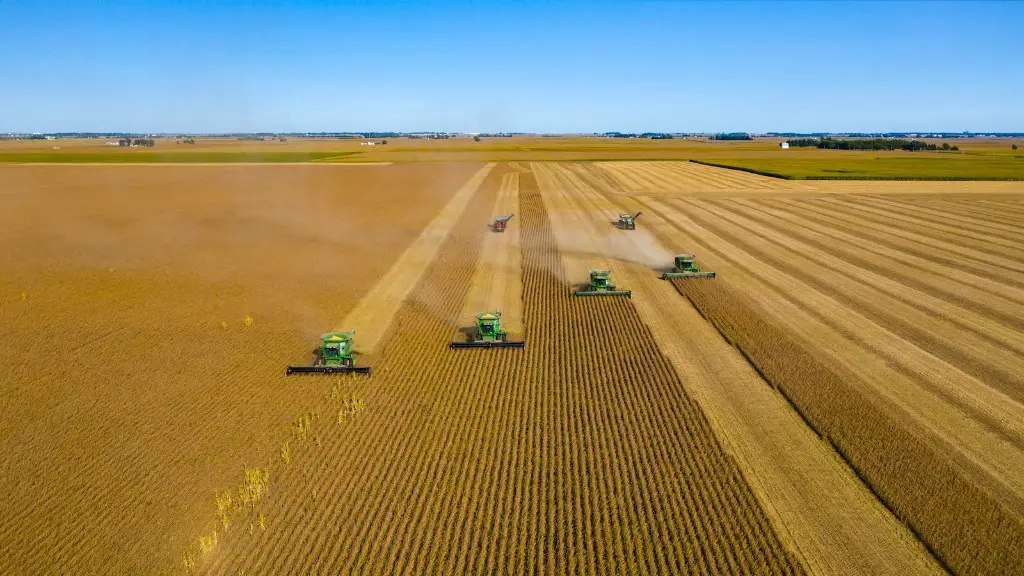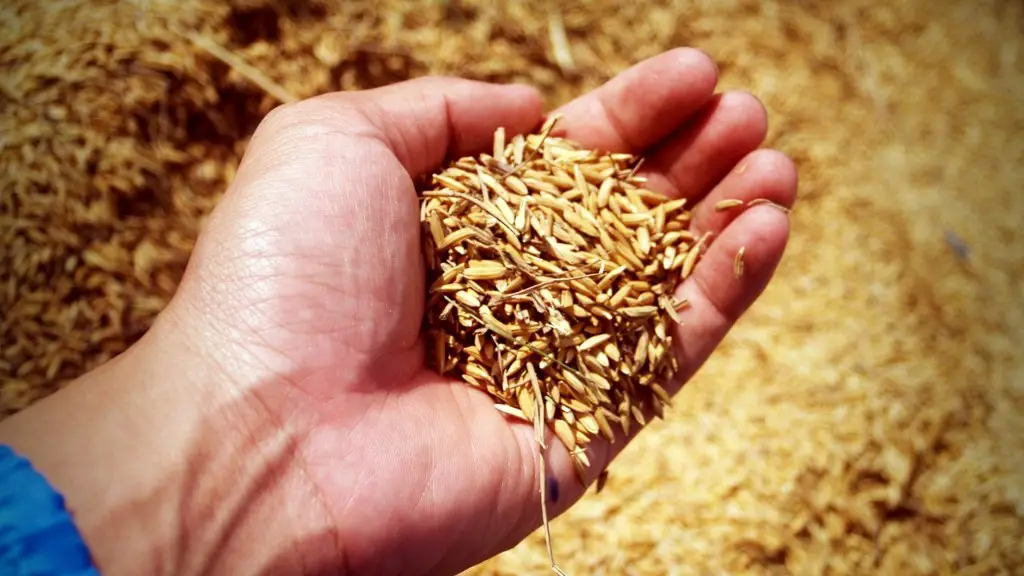Biodiversity is important to agriculture because it helps maintain a healthy and productive ecosystem. A diversity of plant and animal species helps provide food and shelter for a variety of animals, helps control pests and diseases, and helps cycle nutrients.
Biodiversity is important to agriculture for many reasons. It helps to ensure the health of crops and animals, as well as the overall ecosystem. Biodiversity also helps to improve productivity and to reduce the risk of crop failures. Additionally, it can provide resistance to pests and diseases, and can help to improve the quality of the food supply.
What is the relationship between agriculture and biodiversity?
Agriculture is the largest contributor to biodiversity loss. The conversion of natural habitats to intensely managed systems and the release of pollutants, including greenhouses gases, are the main reasons why agriculture is destroying biodiversity. The growing populations and changing consumption patterns are exacerbating the problem.
The importance of biodiversity cannot be understated. Healthy ecosystems are essential to our well-being, and preserving them is crucial to ensuring a sustainable future for all. Biodiversity is not only good for the environment, but also for the economy and for human health and culture. It is an essential part of the solution to climate change, and preserving it is essential to our future.
Why biodiversity is so important
Biodiversity is essential for the processes that support all life on Earth, including humans. Without a wide range of animals, plants and microorganisms, we cannot have the healthy ecosystems that we rely on to provide us with the air we breathe and the food we eat. And people also value nature of itself.
Food production relies on biodiversity for a variety of food plants, pollination, pest control, nutrient provision, genetic diversity, and disease prevention and control. Both medicinal plants and manufactured pharmaceuticals rely on biodiversity.
What is the meaning of biodiversity in agriculture?
Agricultural biodiversity is a key component of food security and plays a critical role in ensuring a resilient and productive food system. A diversity of crops and livestock helps to ensure that food production is not interrupted by pests and diseases, and that farmers have the ability to adapt to changing conditions.
The loss of agricultural biodiversity is a major threat to food security, as it reduces the resilience of the food system and makes it more vulnerable to shocks. The loss of traditional knowledge and skills associated with agricultural biodiversity is also a major concern, as this knowledge is vital for the conservation and sustainable use of biodiversity.
There are many ways to conserve and promote agricultural biodiversity, including agroforestry, crop rotation, and the use of traditional varieties and breeds. It is also important to support the rights of farmers and indigenous peoples to access, use and conserve agricultural biodiversity.
Agricultural biodiversity includes all components of biological diversity of relevance to food and agriculture. It includes plants’ genetic resources: crops, wild plants harvested and managed for food, trees on farms, pastures and rangeland species, medicinal plants and ornamental plants of aesthetic value.
What are the 4 main benefits of biodiversity?
Human dependence on biodiversity is often underestimated. We depend on biodiversity for more than just the food we eat, the air we breathe, and the water we drink. Biodiversity provides a range of other services that are essential to human health and well-being. These services have been classified into four main categories: provisioning, regulating, cultural, and supporting.
Provisioning services are those that provide us with direct benefits, such as food, water, fuel, and timber.
Regulating services are those that help to regulate our environment, such as climate regulation, pollination, and pest control.
Cultural services are those that provide us with recreational, aesthetic, and spiritual benefits.
Supporting services are those that underlie all other ecosystem services, such as soil formation and nutrient cycling.
Biodiversity is essential for all of these services, and the loss of biodiversity can have severe consequences for human health and wellbeing. The Millennium Ecosystem Assessment found that 60% of the world’s ecosystem services are being degraded or used unsustainably (Millennium Ecosystem Assessment 2005). This is a cause for concern, and we need to take action to protect and conserve biodiversity.
A healthy biodiversity is essential for the proper functioning of ecosystems and the provision of natural services. Biodiversity helps to protect water resources, form and protect soils, store and recycle nutrients, break down and absorb pollution, and contribute to climate stability. Biodiversity also helps to maintain ecosystems and recover from unpredictable events.
How can farmers increase biodiversity
Hedgerows are an important part of landscapes in the UK. They provide important habitats for a variety of wildlife, including birds, small mammals and invertebrates. They also play a role in the movement of these animals between different areas of habitat.
Native hedgerow species, such as hawthorn, support a greater abundance and diversity of wildlife than non-native species. It is therefore important to replant hedgerows with native species whenever possible.
Leave occasional trees or bushes to mature within hedgerows. These provide feeding and nesting habitats for a greater variety of birds and other animals.
Biodiversity matters to jobs, health and the economy for a variety of reasons. First, biodiversity ensures health and food security. Second, biodiversity helps fight disease. Third, biodiversity benefits business. Fourth, biodiversity provides livelihoods. Finally, biodiversity protects us from floods, storms and other environmental hazards. By protecting biodiversity, we protect our jobs, our health and our economy.
What are 6 reasons why biodiversity is important?
Biodiversity is the variety of life on Earth, and it is important to preserve it because all life forms contribute to the health and balance of our ecosystems. The following are six reasons why preserving biodiversity is so important:
1. Ecosystem productivity: The more diverse an ecosystem is, the more productive it tends to be. This is because different species of plants and animals provide different services that contribute to the overall productivity of the system.
2. Medical discoveries: As our understanding of the natural world increases, we are discovering new and potentially life-saving medical treatments from plants and animals. For example, the cancer-fighting drug Taxol is derived from the yew tree, and the antifungal drug amphotericin B comes from a soil-dwelling fungus.
3. Natural beauty and recreation: The world’s natural ecosystems are a source of great beauty and wonder, and they provide us with important opportunities for recreation and relaxation.
4. Survival of the species: All plant and animal species have an important role to play in the ecosystems they inhabit. If one species disappears, it can cause a ripple effect that could eventually lead to the extinction of other species.
5. Waste disposal and more:
Biodiversity is the variety of all life on Earth, including the different plants, animals, and microorganisms. It is important to ecosystems because it helps to maintain the balance of nature. For example, if there was only one type of plant in an ecosystem, then the animals that eat that plant would also disappear. This would eventually lead to the extinction of the plant.Biodiversity is also important to humans because it provides the food we eat and the materials we use. For example, different fruits and vegetables have different vitamins and minerals that our bodies need. Additionally, trees provide us with wood for building homes and furniture. Finally, different types of plants and animals are used in different medicines.Biodiversity is important to ecosystems because it helps to maintain the balance of nature. It is also important to humans because it provides the food we eat and the materials we use. We must work to protect biodiversity so that we can continue to enjoy the benefits it provides.
Is biodiversity part of agriculture
Agriculture is completely dependent and based on biodiversity. It has facilitated the development of farming systems since the first development of agriculture some 10,000 years ago. This concept is the root and variation within all plant and domesticated animal species.
Plant biodiversity is extremely important for the health of ecosystems and the planet as a whole. Unfortunately, plant biodiversity is under threat from many sources, including the increasing human population, pollution, deforestation, and species extinction. We must do everything we can to protect plant biodiversity, as it is essential for the continued health of our planet.
What is the most important value of biodiversity?
Biodiversity is essential for the health of our planet and its many ecosystems. Without biodiversity, many of the natural processes that keep our planet functioning would not be possible. Soil turnover, water purification, pest control, and other processes are all supported by the many different species of plants, animals, and microbes that make up our planet’s biodiversity.
Biodiversity is also a key factor in mitigating the effects of climate change. Healthy ecosystems are better able to withstand and recover from the impact of extreme weather events, such as floods and droughts. In addition, the many different species that make up a biodiverse ecosystem provide a greater range of options for adapting to changing conditions.
The loss of biodiversity due to human activity is a major environmental concern. Habitat destruction, pollution, and the introduction of non-native species are all major threats to biodiversity. Conserving and restoring biodiversity is essential for the health of our planet and its many inhabitants.
Biodiversity is extremely important for food security – a large number of species ensures that we can harvest a wide variety of fruits, vegetables, and animal products for the dinner table. Ecosystems have evolved over millions of years to become more efficient at producing these food items, so it is crucial that we protect biodiversity in order to maintain a healthy and functioning food system.
What are examples of benefits of biodiversity
Biodiversity is the variability among living organisms from all sources including, inter alia, terrestrial, marine and other aquatic ecosystems and the ecological complexes of which they are part; this includes diversity within species, between species and of ecosystems.
Biodiversity supports human and societal needs in a multitude of ways. For example, it is a source of food and nutrition security, energy, development of medicines and pharmaceuticals and freshwater, which together underpin good health. It also supports economic opportunities, and leisure activities that contribute to overall wellbeing.
The decline in biodiversity has been a cause for concern for many years and there is now a growing consensus that it is essential to take action to halt and reverse this trend. The United Nations Convention on Biological Diversity (CBD) was adopted in 1992 as a response to this problem, and has since become the primary international legal instrument for conserving biodiversity. The CBD provides a framework for action by governments, businesses, civil society and individuals to conserve biodiversity and use it sustainably.
Utilitarian values are the benefits humans obtain from biodiversity. These benefits can be direct, such as food and shelter, or indirect, such as pollination and climate regulation. Ecosystems provide these benefits through the many services they perform.
Utilitarian values are important because they help us meet our basic needs. However, we must also consider the non-utilitarian values of biodiversity, such as its aesthetic and cultural value.
Warp Up
There are a few reasons why biodiversity is important to agriculture. Firstly, a diversity of crops means that farmers are less likely to lose their entire harvest to pests or diseases. Secondly, a diversity of agricultural systems helps to ensure that food production can continue even in the face of climate change. Finally, a healthy environment is essential for the long-term success of any agricultural enterprise.
Biodiversity is important to agriculture for many reasons. It helps to ensure that crops are pollinated, provides genetic diversity which can help to make crops more resistant to pests and diseases, and can provide food and shelter for beneficial insects and other animals.





